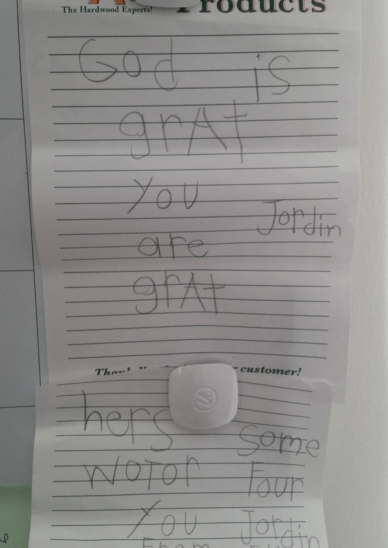“Hers some wotor four you”

By Rev. Jordan B. Davis (M.Div.‘14)
Congregational Corner
 I was recently reminded of a sign that I once saw at a church I visited. Hanging above the coffee machine, which I assume was set up as a welcoming gesture to all who gathered in this space, I read a handwritten note –
I was recently reminded of a sign that I once saw at a church I visited. Hanging above the coffee machine, which I assume was set up as a welcoming gesture to all who gathered in this space, I read a handwritten note –
“It was turned off. Who turned it on? There is no one to make coffee and look after it Monday through Saturday and it can’t be left on with no one around. There is an elder checking the church every day, many times a day. Sometimes she stays several hours. If not, she checks it several times.”
My heart sank as I read this note and wondered if I should even be making a cup of coffee at all? As a visiting pastor, I began thinking about all that this said about the congregation with the grieving currently filling the space and the healing that needed to take place. As a visitor, I wanted to run far away and never return. If this is the note that is left when a coffee machine is left on, what would happen if I (or someone else) did something worse?
Later that morning, I preached on the text of Moses drawing water from the rock (Exodus 17: 1-7). In an effort to make a point, I placed bottles of water throughout the sanctuary. The children’s sermon drew attention to a dirty bottle of water that I had in the pulpit with me, and my need for a clean bottle due to a cold. I asked if anyone had any water to share and after several seconds one person held up their bottle. I made the point that everyone had a bottle to share just as we all have gifts to share. Later in the sermon, I expanded on this idea and knowing the story of this congregation’s grief, I encouraged each person in the congregation to take a bottle of water with them and share it with someone else. “We have the water, the life source that we need. We find it in the gifts of each person here… we have the gifts that nourish this congregation and keep it moving forward… by offering up our bottle of water. No one expected to see those in the pews today, you may not know what gifts are in your life today. But you have them and you can offer them… today, let us step out together in faith and take action.”
I was sure that this would work, that this grieving congregation I had formed a relationship with would begin their healing process now (because every pastor is sure that this sermon will be the word that is needed and finally heard by their congregation!).
Much to my own grief and much like the sign un-welcoming any visitor from making coffee, the bottles remained in the pews. With tears in my eyes, I collected 39 of the 42 bottles. Confused and heartbroken, I started packing up my stuff and said a prayer that somehow this congregation would find a way to stand together and answer their call to ministry. As I took a deep breath, a six-year-old came up to me and handed me a note and a bottle of water – “God is grat. You are grat. Hers some wotor four you Jordin.”

The child got it. The adults didn’t, but the child did. Isn’t that the case in so many situations? The adults are so worried about the best way to do things, we never actually do them. Meanwhile, the children are handing out the bottles of water and showing the visitors the secrets of the church. The children are asking the questions that the adults are afraid to answer in case they say something wrong. The children are seeing the pain and grief, the violence and exclusion, the snowballing effect of one ignored event or action after another and they are the ones leading the way to change.
They are children though and they don’t know any better.
I wonder what the sign over the coffee machine would have said if a child wrote it. I like to think it would have said something like, “The machine is on in case you are thirsty. Just take the little cup of coffee and put it in. Hit the big button and it will do the rest. Then you can come play with me!”
What if we were to think and act more like children?
Grief would last until someone kissed us, everyone would have water (or coffee), we would all be friends and the world would be a much less violent place.
“11 When I was a child, I used to speak like a child, reason like a child, think like a child. But now that I have become a man, I’ve put an end to childish things. 12 Now we see a reflection in a mirror; then we will see face-to-face.”
(1 Corinthians 13: 11-12a)
I pray that we all might see the world through a child’s eyes once again and bring back those childish things we have hidden deep within. If we truly believe the claim that the children are the future of our church, let us strive to live and act as they do as we open the doors for them to be the present church…
… it just might be as simple as handing someone a bottle of water.
Alumna Jordan B. Davis is transitional associate pastor at Kirk of Kildaire Presbyterian Church in Cary, North Carolina, and editor of Congregational Corner.

